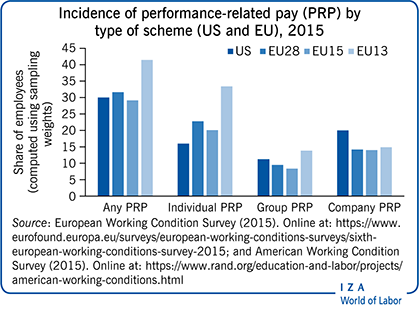Elevator pitch
A growing number of firms offer compensation packages that link pay to performance. The aim is to motivate workers to be more efficient while also increasing their attachment to the company, thereby reducing turnover and absenteeism. The effects of performance-related pay on productivity depend on the scheme type and design, with individual incentives showing the largest effect. Governments often offer tax breaks and financial incentives to promote performance-related pay, though their desirability has been questioned due to large deadweight losses involved. The diffusion of remote work will increase the relevance of performance-related pay.

Key findings
Pros
Linking pay to performance is expected to increase worker motivation, effort, and loyalty to the firm.
Pay incentives raise job satisfaction, lower absenteeism and turnover rates, and have a sizable effect on company performance.
Incentive schemes increase wage flexibility and the reallocation of high quality workers to high productivity firms.
The diffusion of remote work may involve a shift from input- to output-based compensation schemes such as performance-related pay.
Digital technologies may improve performance measurement, thus improving the targeting of performance-related pay.
Cons
The effects of performance-related pay schemes differ significantly according to their design and the type of firms.
When pay incentives are ill-designed, the effects can be perverse and counterproductive.
More risk averse workers may be reluctant to accept jobs with performance-related pay.
When performance is difficult to measure, or when employees’ intrinsic motivation is relevant, performance-related pay may generate distorted incentives and have unintended consequences on worker morale.
Linking pay to performance may generate excessive stress and be detrimental to long-term performance.